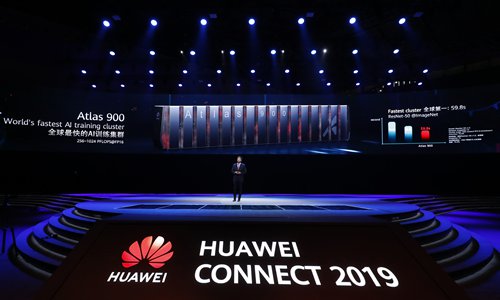
Photo: Shen Weiduo/GT
Chinese telecommunications giant Huawei Technologies on Wednesday announced its computing strategy and the release of what it claims to be the world’s fastest AI training cluster, the Atlas 900. This is another important move after the layout of its 5G and self-developed operating system HarmonyOS, and it aims to challenge industry giants like Google, according to industry analysts.
The Atlas 900, combining the power of thousands of its self-developed Ascend processors, will bring new possibilities to different fields of scientific research and business innovation – anything from astronomy to oil exploration, Ken Hu Houkun, deputy chairman of Huawei, said at the Huawei Connect 2019 held in Shanghai on Wednesday.
Building on the technical strength that Huawei has developed over the past decade, Hu said that Atlas 900 takes only 59.8 seconds to train ResNet-50, the gold standard for measuring AI training performance. This is 10 seconds faster than the previous world record.
Huawei also firstly announced its computing strategy at the event on Wednesday, reiterating its focus in the sector in a bid to carve out a place in the market that is expected to be worth more than $2 trillion by 2023.
Hu introduced the sectors the company will focus on in the industry, including architecture innovation, investment in its all-scenario processors and the construction of an open ecosystem, which will involve an investment of another $1.5 billion in its developer program.
“The layout in the computing sector mainly aims to rival industry giants like Google, which has the strongest computing power in the world. The world’s major breakthroughs in the AI sector also come from Google,” Jiang Junmu, chief writer at the telecom industry news website c114.com.cn, who covers Huawei closely, told the Global Times on Wednesday.
The biggest barrier for AI research is the lack of computing ability; the computing power also determines the level of research output, Jiang said.
Global Times

